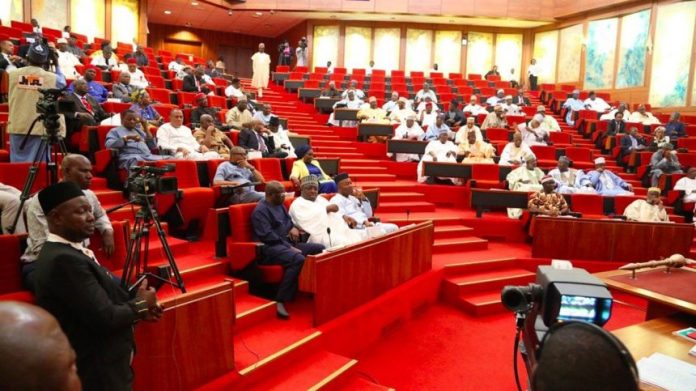The Federal Government’s plan to overhaul Nigeria’s tax system has taken another step forward. The National Assembly has received over 200 memoranda from various stakeholders, including government agencies, private sector representatives, civil society groups, and tax professionals.
These submissions were part of public hearings held by the Senate and House of Representatives to review proposed tax reforms.
The hearings allowed stakeholders to present their views on how best to balance revenue generation, economic growth, and fairness for businesses and individuals. Lawmakers received 54 memoranda in the House of Representatives alone, showing widespread public interest in the reform process.
Issues Arising from the Hearings
The proposed reforms aim to modernize Nigeria’s tax system. Some government officials and economists say the changes will reduce the budget deficit, improve tax compliance, and simplify tax collection. However, critics warn that some measures could hurt small businesses and middle-class taxpayers.
Adjustments to Value Added Tax (VAT) and income tax brackets were among the most debated topics. Some business groups worry that tax hikes on raw materials could increase production costs, hurting local industries. Others argue that expanding the tax base rather than increasing rates would be a better approach.
The National Association of Chambers of Commerce, Industry, Mines, and Agriculture (NACCIMA) called for lower corporate taxes to attract investment and create jobs. The Manufacturers Association of Nigeria (MAN) also urged the government to avoid increasing taxes on production inputs.
The Nigerian Labour Congress (NLC) focused on protecting low-income earners. It pushed for a progressive tax system where wealthier individuals and corporations contribute more, reducing the burden on ordinary workers.
Civil society groups like Tax Justice Network Africa called for stronger measures against tax evasion, especially by multinational companies. They also stressed the need for transparency in how tax revenues are used.
Representatives from the oil and gas sector voiced concerns about how tax reforms could affect their industry. They emphasized the need for stable, predictable tax policies to keep Nigeria competitive globally. Meanwhile, the Nigerian Bar Association (NBA) urged lawmakers to ensure legal clarity in the reforms to prevent confusion and disputes.
Other groups, including the Alumni Association of the Legislative Mentorship Initiative and Project Sprint, also contributed to the discussions. Some praised the reforms as a step toward economic stability, while others raised concerns about the impact on consumers and businesses.
Next Steps for Lawmakers
With public hearings completed, lawmakers will now review the memoranda and stakeholder feedback before finalizing the tax reform bills. The goal is to create a tax system that supports economic growth while ensuring fairness and sustainability.
While there is general agreement on the need for tax reforms, opinions differ on how to implement them. The National Assembly must balance multiple interests to develop policies that benefit businesses, individuals, and the economy as a whole.
The coming months will be critical as legislators refine the proposals. Stakeholders remain hopeful that the final reforms will encourage economic stability, reduce inequality, and enhance government revenue. The decisions made now will shape Nigeria’s tax system and economic future for years to come.
20 Key Provisions of the Tax Bill
Since the transmission of the bills, they have generated significant controversies and protests among Nigerians with some governors and traditional rulers of northern extraction kicking against them. Below are 20 key provisions of one of the tax bills.
•Increment in VAT: Value Added Tax (VAT) will increase from 7.5% to 10% by 2025, 12.5% from 2026 to 2029, and 15% from 2030 onwards.
•VAT Exemptions: Essential items like food, education, and healthcare will be exempt from VAT.
•Tax Relief for Low-Income Earners: Individuals earning ¦ 800,000 or less annually will be exempt from Personal Income Tax (PIT).
•Progressive PIT System: A more progressive PIT system will be introduced, with reduced rates for low-income earners.
•5% Excise Tax on Lottery and Gaming Income Section 62 and Schedule 10 of the law propose 5 percent excise duty on revenue of lottery and gaming trade or business.
•5% Telecoms Tax: The bill proposes a five percent excise duty on telecommunications services, including post-paid and prepaid services regulated by the Nigerian Communications Commission (NCC).
•Increased CIT Exemption Threshold: The threshold for Companies Income Tax (CIT) exemption will be raised from ¦ 25 million to ¦ 50 million in turnover.
•Streamlined Tax Processes: The Nigeria Tax Administration Bill aims to create a centralized and user-friendly process for tax registration, filing, and dispute resolution.
•Joint Revenue Board: A stronger Joint Revenue Board will be established to improve coordination between federal and state governments.
- Tax Ombudsman: A Tax Ombudsman will be introduced to ensure fairness and protect Nigerians from unjust taxation.
•Nigeria Revenue Service: The Federal Inland Revenue Service (FIRS) will be renamed to the Nigeria Revenue Service (NRS).
•Revenue Sharing Formula: A new revenue sharing formula will allocate 10% to the federal government, 55% to states, and 35% to local governments.
•Electronic Invoicing: Taxpayers will be required to use electronic invoicing systems to accurately record and report taxable supplies.
•VAT Fiscalisation System: A VAT fiscalisation system will be introduced to streamline tax reporting and enhance compliance.
•Penalty for Non-Compliance: Failure to comply with the VAT fiscalisation system will result in a penalty of ¦ 200,000, plus 100% of the tax due, and an annual interest rate of 2% above the Central Bank of Nigeria’s (CBN) Monetary Policy Rate (MPR).
•Tax Relief for Entrepreneurs and Self-Employed Individuals: Tax reliefs will be extended to entrepreneurs and self-employed individuals with regard to PIT.
•Reduction in Companies Income Tax Rate: The CIT rate will be reduced from 30% to 27.5% in 2025 and 25% in subsequent years.
•Exemption from Withholding Tax: Small businesses will be exempt from withholding tax deductions on business income.
•Capital Gains Tax Exemptions: Certain capital gains will be exempt from taxation, including proceeds from the sale of residential property or land adjoining the residential property up to a distance of 1 acre.
•4% Development Levy on Companies Section 59 stipulates a development levy on the accessible profits of companies, excluding small and non-resident companies. The levy will be four percent for 2025 and 2026, three percent from 2027 to 2029, and two percent from 2030 onwards.
Like 👍, Comment, share this article, and Follow us on our social media handles.
Feel free to download and share our Daily Newsletter for Saturday, March 10, 2025. 👇







